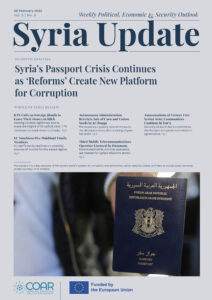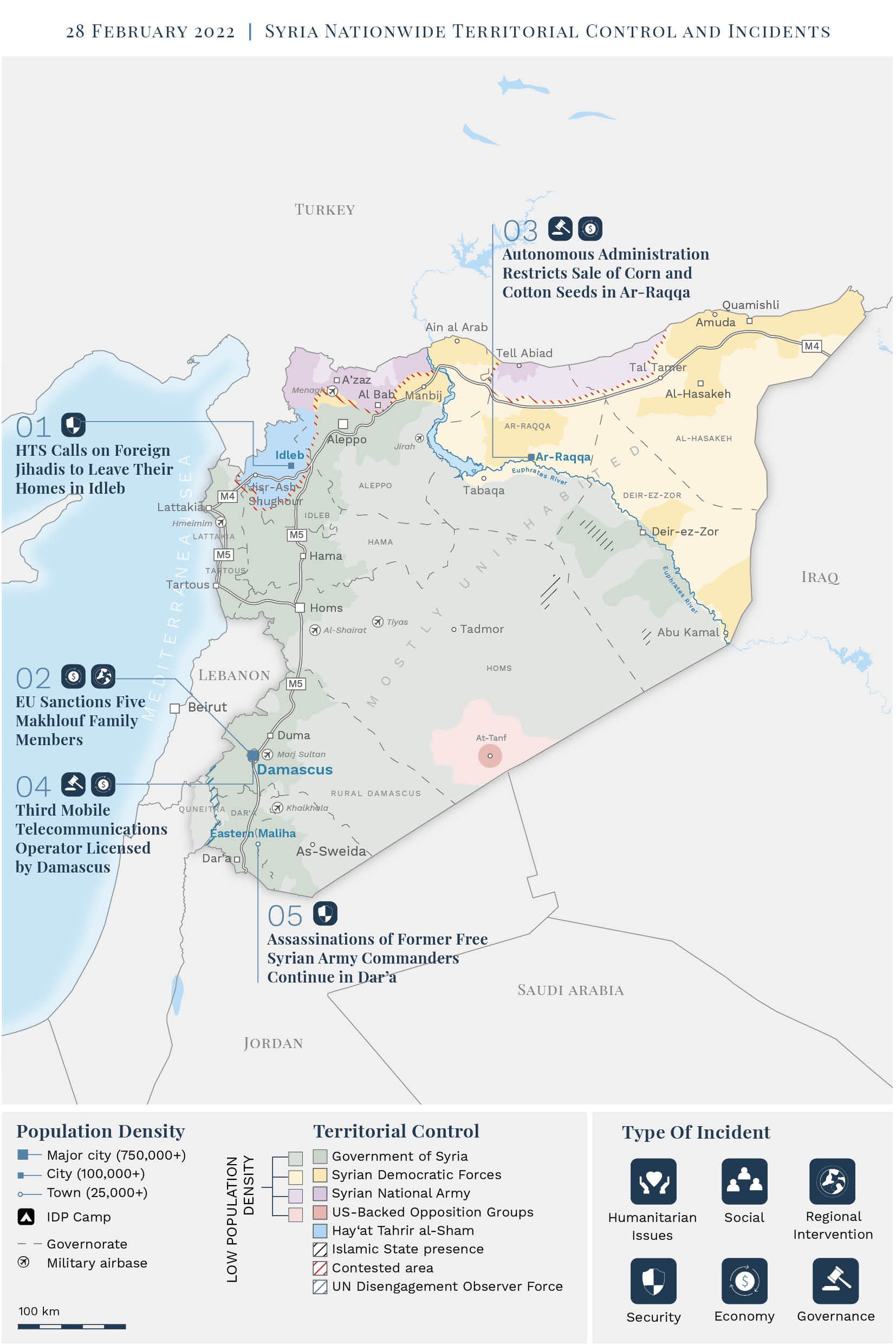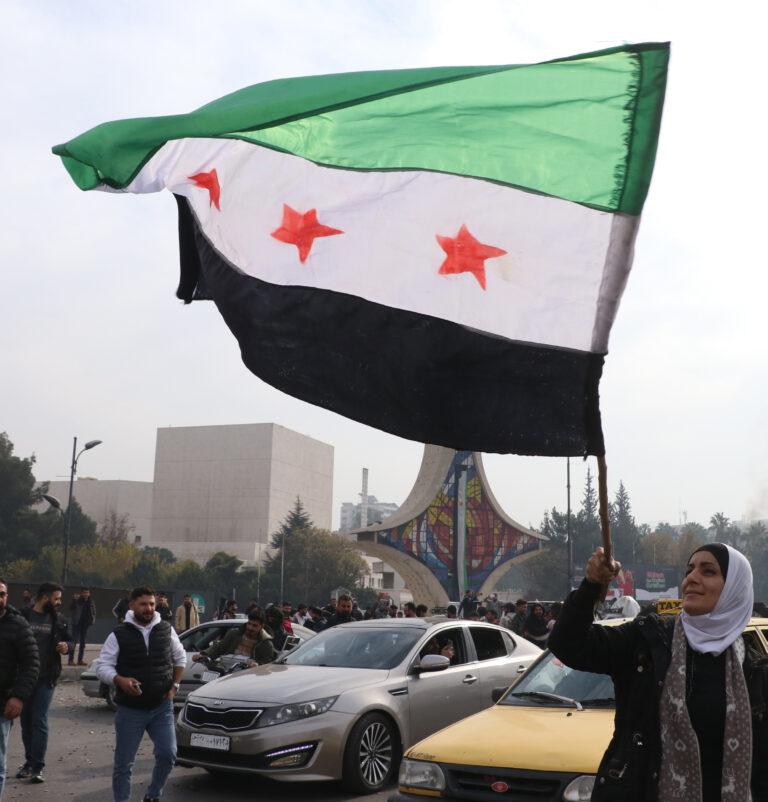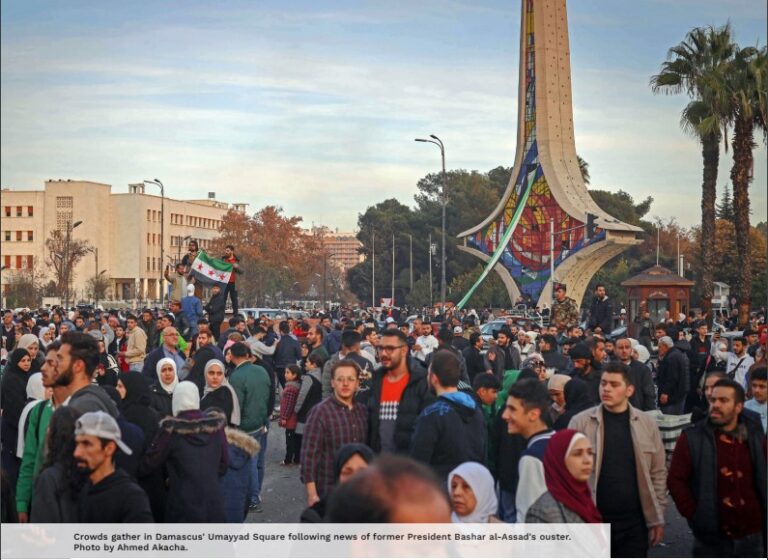NOTE: On Thursday, 24 February 2022, Russia triggered the start of a major international armed conflict with its invasion of Ukraine. While still in its early stages, this event will undoubtedly have far-reaching geopolitical consequences, including for Syria, the government of which is one of the few that has expressed support for Russia’s actions. While it is too early for a confident assessment of the impacts the Ukraine crisis may have on Syria and the architecture of the aid response, actors in the aid sector should be taking the linkages between the two conflicts into account in their planning, and considering how potential ramifications of one might affect the other. For more on Russia’s involvement in Syria, see: Syria Update 21 February 2022.
Syria Update Digest
Media sources reported ongoing long queues and severe overcrowding at Immigration and Passport Department branches across Syria — despite the November 2021 introduction of an online platform to tackle the problem. Syria has long had a passport issuance crisis, with Syrians waiting months to receive a new passport. The online platform, which allows Syrians to apply for passports online, is only briefly accessible twice per day, leading many to pay bribes to “brokers” to book appointments for them. The difficulties in accessing passports speak to broader issues of government service reform in Syria, namely endemic corruption and limited state resources. Corruption is likely to hamper Syrian Government service provision as long as bribes remain a key source of livelihoods and the state remains largely extractive.
- On 18 February, local media reported that Hay’at Tahrir al-Sham (HTS) had recently issued an injunction to several foreign jihadis to evacuate their houses and leave Idleb with their families. By intensifying its clampdown on foreign jihadis, HTS seeks to counter suspicions that it is abetting the hiding of IS leaders in its territories, as well as signal its willingness to cooperate with the international community’s counterterrorism efforts.
- On 21 February, the European Union Council added five members of the Makhlouf family to its sanctions list, freezing their assets and banning them from travel. This move indicates that sanctions will likely remain the EU’s primary form of leverage against the Syrian Government until its demands for political transition (based on UN Security Council resolution 2254) are met.
- The Autonomous Administration of North and East Syria recently issued a circular to agricultural suppliers in Ar-Raqqa and its countryside prohibiting the sale of imported cotton and corn seeds to farmers without first obtaining a licence. Restrictions on the trade of seeds could compound an already grim reality for the agricultural sector and food security in northeast Syria.
- On 21 February, the Syrian Telecommunication and Postal Regulatory Authority activated the licence of a third mobile operator in Government-controlled areas, Wafa Telecom. It is unclear whether the new operator will invest in expanding network coverage and improving services, or will instead replicate existing networks in the pursuit of profit for its regime-aligned owners.
- On 20 February, former Free Syrian Army commander Ismail Shukri al-Dar’an was assassinated in the town of Eastern Maliha, Dar’a Governorate. The security chaos in Dar’a is not a novel phenomenon and reflects the limited success of Russia-brokered reconciliation deals to bring the restive south under Government of Syria control.

In-Depth Analysis
On 20 February, media sources reported long queues and severe overcrowding at Immigration and Passport Department branches across Syria — despite the November 2021 introduction of an online platform to tackle the problem — as deteriorating living conditions in areas under Government of Syria control drive massive demand for passports. Daily crowding has been particularly acute in As-Sweida, the site of recent protests (see: Syria Update 14 February 2022), where Syrian Government officials are allegedly demanding bribes of up to one million SYP to issue passports. Meanwhile, “passport brokers”, intermediaries linked to immigration officials, accept bribes to secure passport appointments — a widespread phenomenon in Syrian consulates and embassies in other countries (see: Syria Update 13 December 2021). The continuing passport crisis highlights the limitations of the Syrian Government’s reforms and its inability to satisfy the needs of its citizens amid endemic, and systemic, corruption.
Meet the new boss, same as the old boss
Syria has long had a passport issuance crisis, with Syrians waiting months to receive new passports. Government officials have attributed this to sanctions preventing the import of sufficient passport materials and ink. Others have claimed that the passport crisis was manufactured by the Government to impose further restrictions on those wishing to travel and to facilitate as much corruption and extraction as possible. Passports have been a key source of revenue for the Syrian state, particularly from those living abroad, who pay up to 800 USD for an expedited passport renewal (see: Syria Update 13 December 2021). In November 2021, the Syrian Ministry of the Interior introduced an “instant” (same day) passport service inside Syria for 100,000 SYP (around eight times the regular cost).
The Government of Syria introduced an online platform for passport applications and appointments in November 2021. However, this platform has merely created a new layer of corruption and failed to resolve crowding issues. The platform is briefly accessible only twice per day, requiring a fast internet connection to book an appointment amid surging demand. Syrians are thus resorting to paying bribes of between 100,000 and 800,000 SYP to the aforementioned “brokers” to secure appointments through the online portal. Other “brokers” claim to be able to renew a passport within a week for 1.5 million SYP. These costs are a significant burden for Syrians who already face a cost-of-living crisis.
The limits of reform laid bare
The difficulties in obtaining passports speak to broader issues of government service reform in Syria, namely the problem of endemic corruption and limited state resources. Whether the new platform was designed to add another layer of resource extraction, or simply lacks the capacity to keep up with demand, it has failed to solve the crisis of crowding, and instead opened up new avenues for corruption. Corruption is intrinsic to the way the Syrian Government operates; state employees leverage the distribution of scarce resources to supplement their meagre salaries (see: Syria Update 20 December 2021), while regime-aligned actors extract wealth through key contracts and business deals.
Without wholesale reform, improved salaries, and investment in the state’s capacities, corruption will continue to blight Syria (see: Syria in 2022: New Aid Approaches for an Evolving Crisis). Furthermore, anti-corruption initiatives are unlikely to lead anywhere while access to government services is competitive, rather than universal. Donors and aid actors should be aware that the pervasive mechanisms of corruption within Syria are central to its political economy; the state is largely extractive, and bribery is a key source of livelihoods. However, donor governments’ red lines will likely continue to prevent the aid sector from working to improve the machinery of the state as long as al-Assad remains in power.
Whole of Syria Review

HTS Calls on Foreign Jihadis to Leave Their Homes in Idleb
On 18 February, local media reported that Hay’at Tahrir al-Sham (HTS) had issued injunctions to several foreign jihadis and their families to vacate their houses and leave Idleb for an unspecified destination. HTS’s jihadi critics have claimed that the group’s refusal to renew the leases is part of a systematic campaign to drive them out of its area of control. HTS has denied such claims, emphasising that the decision targets foreigners and locals who live in houses that are either public property or belong to individuals who have made claims of ownership. The group added that some of the individuals asked to evacuate had committed criminal or security offences.
Erasing stigma
By intensifying its clampdown on foreign jihadis, HTS seeks to end speculation regarding its involvement in hiding Islamic State (IS) leaders in its territories (see: Syria Update 7 February 2022) and signal its willingness to cooperate with the international community’s counterterrorism efforts (see: Syria Update 1 November 2021). The fact that the last two IS leaders were killed in Idleb is a heavy reputational burden for a group that has been relentlessly seeking to erase the stigma of its radical past (see: Syria Update 14 June 2021). HTS’s efforts include cracking down on terrorist groups such as IS and Al-Qaeda, and regulating the presence of foreign jihadis by issuing ID cards for Idleb residents without which access to public services, completion of transactions, and passage through HTS checkpoints become almost impossible. While foreign jihadis, some of whom are either wanted by their countries or by the US-led International Coalition, may pose a threat to security in Idleb, driving them out simply displaces the problem from one area to another. Additionally, there are wider protection issues at play with HTS’s heavy-handed approach; what can be done to jihadis can be done to other individuals deemed persona non grata by the group, whether they pose a threat to general security or merely to its own power and control.
EU Sanctions Five Makhlouf Family Members
On 21 February, the Council of the European Union added five members of the Makhlouf family to its sanctions list, freezing their assets and subjecting them to a travel ban. The sanctioned individuals are the widows and daughters of Mohammad Makhlouf, the founder of the Makhlouf family business empire and an uncle of President Bashar al-Assad. Rami Makhlouf, Mohammad Makhlouf’s son (who is also on the EU’s sanctions list) took over the family business shortly after Bashar al-Assad ascended to the presidency in 2000. However, following a rift within al-Assad’s ruling circle, the Syrian Government cracked down on Rami Makhlouf, seizing his assets in 2019, and pushing him out of the political and economic scene. Leaks from HSBC in 2015, as well as recent leaks from Credit Suisse, revealed that Mohammad Makhlouf remained in control of assets held at European banks until his death from COVID-19 in 2020. An EU press release indicated that Makhlouf’s death “posed the risk” that assets inherited by his family members could be used to finance the “regime’s violent repression of the civilian population”.
EU cuts a hard line with its favoured tool
The timing of EU sanctions on individuals close to the al-Assad family reaffirms the EU’s political imperatives: no normalisation, no lifting of sanctions, and no reconstruction until the Government of Syria commits to political transition. It also signals the EU’s stance towards the normalisation efforts spearheaded by some regional states (see: Syria Update 15 November 2021). In its press release, the EU stressed its commitment to finding a “lasting and credible” political solution based on UN Security Council resolution 2254. While the EU is willing to engage in early recovery programming to offer improved access to “basic services for those in desperate need”, an active sanctions policy towards Syrian regime figures remains the EU’s primary political lever in Syria, and as such is unlikely to be abandoned anytime soon. It is unclear whether the targeted figures were involved in financing the Syrian Government’s activities following Rami Makhlouf’s dispute with President al-Assad in 2019. Nevertheless, when it comes to potential sources of income for the Syrian regime, the EU’s approach appears to be “better safe than sorry.”
Autonomous Administration Restricts Sale of Corn and Cotton Seeds in Ar-Raqqa
On 20 February, media sources reported that the Autonomous Administration of North and East Syria recently issued a circular to agricultural suppliers in Ar-Raqqa and its countryside prohibiting the sale of imported cotton and corn seeds to farmers without obtaining a licence from the Agricultural Management Committee of the Ar-Raqqa Civil Council. It stipulated that transgressors would be shut down or fined. The Autonomous Administration portrayed the decision as a quality control measure, which limited the sale of imported seeds to 20 licensed outlets. As a result, dozens of tons of seeds in the warehouses of unlicensed traders and pharmacists became unmarketable, and were sold at a loss to the Ar-Raqqa Civil Council.
The bottom of the breadbasket
Restrictions on the trade of seeds could compound an already grim reality for the agricultural sector and food security in northeast Syria. This decision follows a string of lean seasons for cotton and corn in Ar-Raqqa, mainly due to the drop in the Euphrates River’s water levels and one of the worst droughts to afflict Syria in recent memory (see: Syria Update 10 January 2022). Only 14 thousand hectares of cotton were cultivated in Ar-Raqqa Governorate this year, compared to an average of 40 thousand hectares per year before 2011. The Autonomous Administration has previously taken similar quality control measures for wheat seeds; however, controlling access is not the only possible approach. Establishing a quality control committee within the Ar-Raqqa council could serve as an alternative that would avoid putting agricultural centres out of business and restricting farmers’ access. Engaging with regional and international technical institutions that assess seed quality is one way in which donors can support the sector.
Third Mobile Telecommunications Operator Licensed by Damascus
On 21 February, the Syrian Telecommunication and Postal Regulatory Authority officially activated the licence of a third mobile operator in Government-controlled areas, Wafa Telecom. Set to launch operations in November 2022, Wafa will rely on the infrastructure of Syria’s existing operators, SyriaTel and MTN, until its own network is established (after an estimated two years of service). According to Syria’s Telecommunications Minister, Wafa will target areas with poor coverage and provide a discount of up to 50 percent until it reaches 3 million subscribers. Wafa will also have an exclusive licence to operate a fifth generation (5G) mobile network. The licence will be extended to SyriaTel and MTN if the company is unable to provide effective 5G service after two years. Wafa’s major shareholders are the Arabian Business Company LLC, the ownership of which is unclear, and Wafa Invest LLC, owned by Yassar Ibrahim, a US-sanctioned businessman close to the Assad regime. The state-run Syrian Telecommunications Company is the third largest shareholder, strongly suggesting that the company is closely tied to existing telecom monopolies in Damascus.
A mirage of progress
The introduction of a new operator alongside SyriaTel and MTN, which are effectively controlled by the Syrian Government (see: Syria Update 8 March 2021), should be viewed as yet another avenue for revenue extraction by the state (see: Syria in 2022: New Aid Approaches for an Evolving Crisis). While a headline-grabbing announcement, a 5G network is unlikely to be developed, and indeed would likely prove a white elephant. The infrastructure required is costly, and its major use cases (such as smart cities and the internet of things) have little relevance in Syria, where consistent access to mobile broadband is a more pressing issue. It is unclear whether the new operator will have the capital to invest in significantly expanding coverage, or whether it will instead replicate existing networks in the pursuit of profit for its regime-aligned owners. Poor internet and mobile coverage for residents is likely to persist, presenting challenges for aid programmes which rely heavily on mobile connectivity for communications and outreach.
Assassinations of Former Free Syrian Army Commanders Continue in Dar’a
On 20 February, former Free Syrian Army commander Ismail Shukri al-Dar’an was assassinated in the town of Eastern Maliha, Dar’a Governorate. Al-Dar’an was known for his staunch opposition to the Syrian Government, illustrated by his refusal to join the reconciliation agreement brokered by Russia in 2021 (see: Syria Update 20 September 2021 and Syria Update 11 November 2021). This is the latest in a series of assassinations of key figures of various political persuasion in the south, and follows on the heels of the 10 February killing of Musab al-Bardan, a member of Dar’a’s central negotiations committee.
A violent peace in Syria’s ‘Wild South’
The ongoing security chaos in Dar’a reflects Russia’s limited success in bringing the restive south under Government of Syria control. The Russia-brokered reconciliation agreements (see: Syria Update 5 July 2021) that restored Government control over areas of Dar’a in return for its release of detainees have been undercut by the Syrian Government’s decision to detain some of those who have accepted reconciliation and crack down on those who have not. Local sources have speculated that the Syrian Government may have orchestrated the assassinations to eliminate influential figures who could threaten its control. Given the fragile state of security and the precariousness of the reconciliation agreements, more violence is likely to follow.
Key Readings
The Open Source Annex highlights key media reports, research, and primary documents that are not examined in the Syria Update. For a continuously updated collection of such records, searchable by geography, theme, and conflict actor, and curated to meet the needs of decision-makers, please see COAR’s comprehensive online search platform, Alexandrina, at the link below..
Note: These records are solely the responsibility of their creators. COAR does not necessarily endorse — or confirm — the viewpoints expressed by these sources.
Poverty, fear drive exodus from Syria’s one-time IS capital
What does it say? More than three years after the liberation of Ar-Raqqa from Islamic State control, Raqqawis face daily struggles in the face of poverty, insecurity, and the aftermath of war. Those who are able are leaving for Europe.
Reading between the lines: While recovery is underway, need in Ar-Raqqa and elsewhere in former IS territories is still acute and myriad challenges remain. Failure to “win the peace” poses a real threat to the long-term stability of northeast Syria.
What does it say? Iranian-backed militias expand their influence in eastern Deir-ez-Zor through ideology, protection from Government security services, and a steady pay check to draw child recruits — many of them, ironically, former IS “Cubs of the Caliphate.”
Reading between the lines: In contrast to the Russian strategy, which is dependent on President Bashar al-Assad’s patronage, the Iranians rely on the presence of affiliated militias on the ground, which can have manifold deleterious effects on local communities.
Japan supports WFP’s food assistance in Syria as winter exacerbates already difficult conditions
What does it say? On 22 February, the World Food Program announced that it had received a 5 million USD donation from Japan to provide food assistance to Syria. An estimated 170,000 Syrians will receive food supplies for approximately three months.
Reading between the lines: Half of all Syrians are food insecure, and 1.3 million are severely insecure. Japan’s donation will provide a measure of temporary relief, but clearly will not solve the hunger crisis, which is likely to worsen in 2022.
How Oman became the chief architect of Arab normalisation with Syria
What does it say? Characterised by a pragmatic, Switzerland-on-the-Arabian-Sea approach to fractious regional affairs, Oman has maintained ties with the Government of Syria throughout the war and has found itself well-placed to be the linchpin of normalisation efforts.
Reading between the lines: As the article points out, with Syria in ruins and its economy heavily sanctioned, it is unclear what Oman will gain from the Damascene ‘line of credit’ its efforts have secured. At a minimum, however, Oman has positioned itself as a broker in regional disputes.
The Druze shift of stance in Syria will worry Bashar al-Assad
What does it say? The ongoing As-Sweida protests reveal an evolution in the political identity and priorities of the Druze minority, amongst whom the seeds of demand for long-term political change — not just in As-Sweida, but at a national level as well — have been sown.
Reading between the lines: The As-Sweida protests are without question a barometer of grievances widespread throughout Government-held Syria. Immiseration and hunger are testing the tolerance of many Syrians and could threaten the Government’s grip.
Here to stay: Islamic State revives attacks amid futile counter campaigns in Syria
What does it say? Operating out of the Syrian desert against the backdrop of increasing competition among the local militias and foreign powers active in the region, IS has taken advantage of failed campaigns against it by both Russian-Syrian and Coalition-SDF forces to transform into an endemic threat.
Reading between the lines: IS has devolved into a state of supercharged banditry following the loss of the caliphate, and is unlikely to re-emerge as a territorial actor. However, it is highly adaptive, and the threat it poses as a cultic criminal network operating in and striking from the shadows is likely to persist.
Tishreen University Issues Ban on Beating Students at Lattakia Dormitory
What does it say? The Ba’ath Party branch secretary at Tishreen university issued a ban forbidding the beating of students. The decision also allowed dormitory residents to wear “sports pyjamas” from 3 to 8PM.
Reading between the lines: The fact that university students were apparently subject to beatings, and are still restricted in their choice of attire, speaks volumes about the state of the education system in Government-controlled Syria.
The Russian Army in Syria Offers Training to Syrian Army
What does it say? On 21 February, the Russian ‘Zveda’ TV channel issued a report on the training of Syrian Arab Army (SAA) troops by Russian advisors. The intention is to form elite assault units and, according to analysts, compete with Iran for influence within the SAA.
Reading between the lines: While the degree to which Russian competition with Iran is a motivating factor is questionable, it is true that Russia has consistently supported ‘official’ Syrian state military institutions, and thus, President al-Assad. Iran, by contrast, has attempted to expand its influence through local Islamic Revolutionary Guard Corps (IRGC)-affiliated militias.
Two Medical Centres in Northern Syria Have Ceased Operations Due to Lack of Support
What does it say? On 22 February, the Independent Doctors Organisation announced that two hospitals in Aleppo have ceased operations due to lack of funding, adding to the large number of shuttered health centres in northern Syria.
Reading between the lines: Winter conditions, the ongoing pandemic, and economic privation, and lack of access to medical care will continue to harm civilians in northern Syria, and must be addressed by the aid community.
What does it say? The Syrian National Coalition (SNC) condemned Russia’s invasion of Ukraine, recognising Syrians’ own experience of Russian aggression. Meanwhile, the Government of Syria is one of the few states to have expressed support for Putin’s position.
Reading between the lines: The SNC’s statement underscores the fact that Syria is closely linked to the Ukraine crisis, as is the broader Middle East.
Official verdict | Abu Amsha changed [sic] and “exiled” along [with] several members of his faction
What does it say? A Syrian National Army ‘arbitration committee’ issued a contentious decision to fire Mohamed al-Jasem, the commander of the Suleiman Shah division, for various crimes, and exile him from ‘Olive Branch’ areas (Afrin) for two years.
Reading between the lines: The decision — rumoured to be Turkish-ordered — indicates an attempt to impose some degree of discipline on the fractious militias of the SNA, but is unlikely to have a lasting effect on the worst impulses of what are, in effect, little more than criminal gangs.





